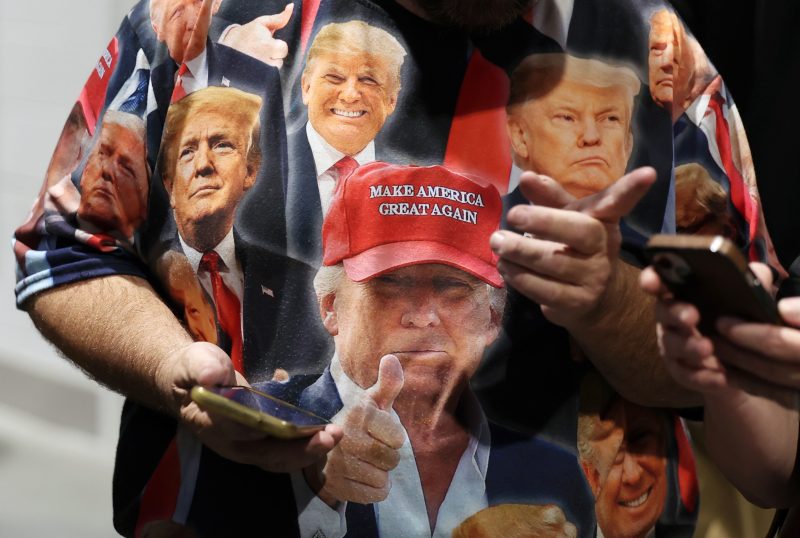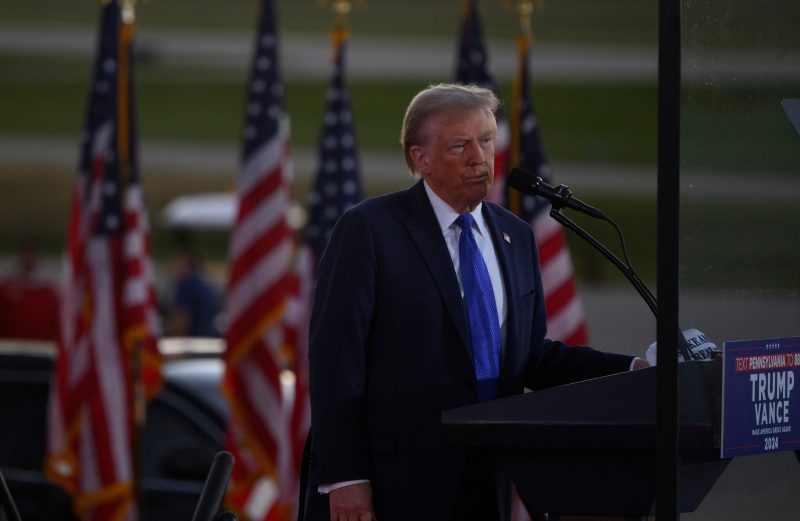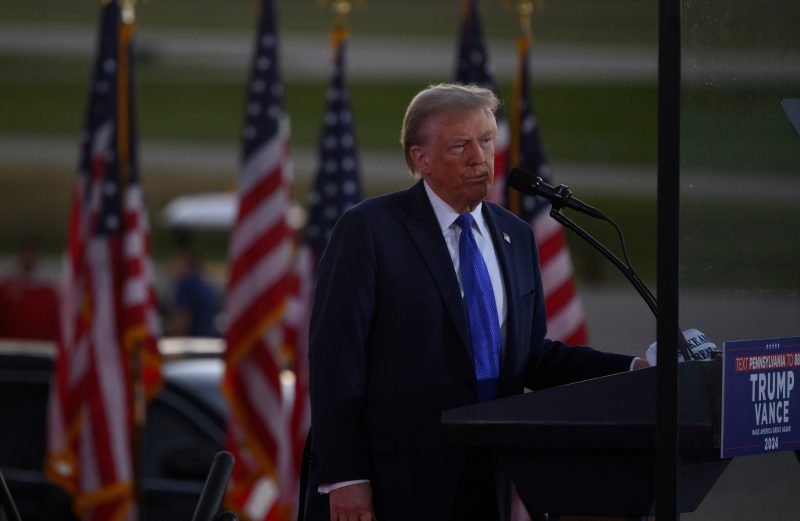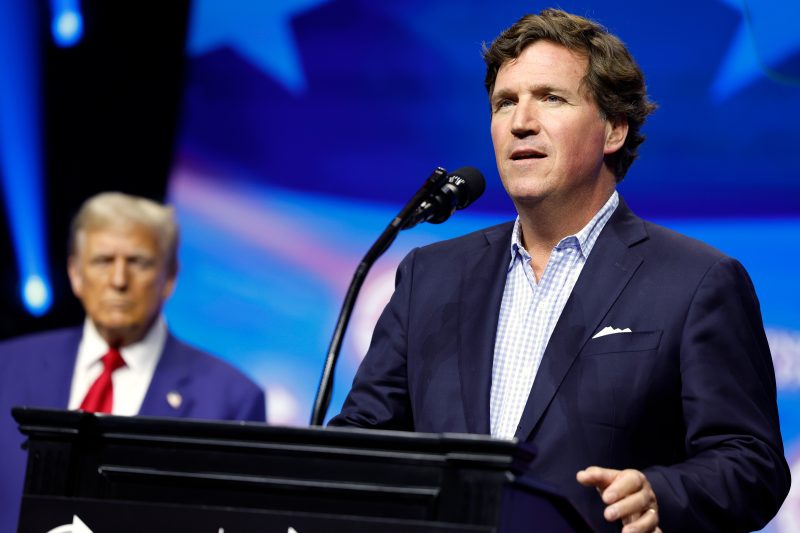
Another chance for Trump to frame Democrats as dangerous has emerged
The day after Secret Service agents confronted an armed man near where Donald Trump was playing golf, the former president told Fox News that the rhetoric of Democrats and Vice President Kamala Harris was to blame.
“He believed the rhetoric of [President Joe] Biden and [Vice President Kamala] Harris, and he acted on it,” Trump said of Ryan Wesley Routh, the man arrested after fleeing the Trump International Golf Club on Sunday. “Their rhetoric is causing me to be shot at,” Trump continued.
And then, seemingly in the same breath, he accused his opponents of posing a threat to the country — the same sort of assertion that he claimed had served as Routh’s motivation.
“And they are the ones that are destroying the country, both from the inside and out,” Trump said. “These are people that want to destroy our country,” he added later. “It is called the enemy from within. They are the real threat.”
Trump’s political appeals have never been particularly subtle, and this one isn’t either. It’s dangerous for Democrats to say these things about him, he insists — as he says those things about Democrats. It is an immediate, obvious blend of three things: his interest in making Democrats wary about describing him as a threat to democracy, his effort in presenting himself as a victim (the central theme of his 2024 candidacy) and his interest in portraying Democrats as dangerous and threatening. That these outcomes are not internally consistent is not the sort of thing Trump loses sleep over.
Other Republicans are a bit more cautious in separating out those impulses, but they still amplify them. Rep. Greg Steube (R-Fla.), for example, said that Democrats were “100 percent” responsible for Routh’s actions — agreeing with a Fox News host’s leading prompt that it was “the constant drumbeat from the left that Trump is a ‘threat to democracy’” — that last phrase offered with obvious sarcasm. Rep. Laurel Lee (R-Fla.), in a separate Fox News interview, suggested Democrats “really need to think about the consequence of using that kind of language.”
Routh’s intent in being at the golf course on Sunday and any motivations are still uncertain as of writing. He was charged in federal court Monday with two gun-related crimes. In social media posts attributed to him, he did express anger at Trump’s effort to retain power after the 2020 election, including criticism of the Capitol riot. He also posted in April that “DEMOCRACY is on the ballot and we cannot lose.”
The posts also give a sense of instability, with his political interests bouncing between the parties and candidates over time. A neighbor told reporters that he was “a little cuckoo.”
Mental instability and violence against prominent figures have an uncomfortable overlap. When a fervent Trump supporter was accused of sending pipe bombs to Democratic elected officials and members of the media, I spoke with Cheryl Paradis, a professor of psychology at Marymount Manhattan College in New York, who wrote a book on mental illness and criminality. She noted that public events can become a point of irrational focus for those suffering from such afflictions.
“What’s going on politically can galvanize, it can become a focus for people who have serious psychiatric illnesses,” Paradis said in 2018. She added that “this is a time in which many people are watching and very focused on the upcoming election, for example — and people have strong feelings about it. People that have psychiatric illnesses, just like anyone else, can be influenced by what’s going on in today’s political climate.”
The point was made more succinctly (and less empathetically) by Trump’s running mate, JD Vance, in an interview that aired on CNN several hours before Routh was confronted on the golf course.
“Are we not allowed to talk about these problems because some psychopaths are threatening violence?” Vance told the channel’s Dana Bash.
Vance was defending himself against criticisms that his amplification of false and baseless claims about immigrants from Haiti led to a spate of threats of violence in Springfield, Ohio. Vance insisted that his assertions were unrelated to bomb threats that had followed his helping to amplify the idea — and that those threats shouldn’t prevent him from continuing to amplify it.
Former Illinois representative Joe Walsh, who was elected as a Republican but is now a fervent Trump critic, offered a similar response following news of Routh’s arrest.
“It’s not complicated,” he wrote on social media: “I oppose Trump because I believe he IS a genuine threat to our democracy. Democracy IS on the ballot in November [and] I oppose political violence and strongly condemn this assassination attempt on Trump.”
There are key differences between the situations, however. One is that the claims Vance elevated targeted a community broadly, without evidence to support what he was asserting and without any offered remedy. However one views Trump’s response to the 2020 election, it’s clear he tried to retain power despite his loss, with disastrous consequences. There’s also a nonviolent means of addressing questions about Trump regaining power: “Ballots, not bullets,” as Walsh’s message concludes.
All of this said, many Republicans sincerely believe Trump is a target of nefarious actors. After a man shot at Trump in Butler, Pa., earlier this year, Trump supporters (including Vance) suggested that “they” had tried to kill the former president, attributing Thomas Crooks’ actions to a broad conspiracy and to anti-Trump politics. Further investigation suggested this wasn’t true, so Republicans (including Trump) pivoted to suggesting the shooting was a function of willful negligence on the part of the Biden administration.
Some go further. After Routh’s capture, Rep. Marjorie Taylor Greene (R-Ga.) offered a new suggestion that his efforts were part of an overarching plot.
“This is very unlikely to be the last time they try to kill Trump,” she wrote on social media. “I do not believe these are lone wolves — crazy people — mad at him because of his ‘rhetoric’ like they want us to believe.”
Even the less extreme iteration of blaming Democrats for Routh’s actions, though, are politically useful for Trump. If it leads to criticisms of his authoritarian impulses being viewed as beyond the pale, his campaign team is unlikely to complain. If it generates more sympathy from his base or new sympathy from undecided voters, even better.
There is a fundamental dishonesty to it, of course. Trump and his allies seek unilateral disarmament, the ability to bemoan Democratic criticisms of Trump as unacceptable and immoral while shrugging at what Trump himself says. If Trump thought it was over the line to describe him as a threat to the country, he probably wouldn’t then describe Harris in that way.
And, again, those criticisms are rooted in Trump’s actions and campaign pledges, not in invented stories about, say, immigrants eating cats. As a leading national politician once asked, are people not allowed to talk about problems just because some psychopaths are threatening violence?



